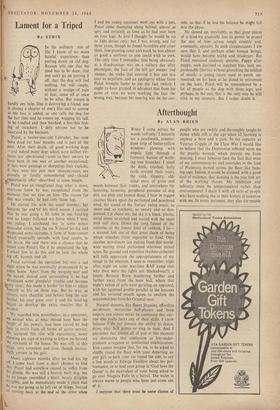Lament for a Triped
By STRIX
IN the ordinary run of life I know of no more hateful experience than putting down an old dog. Reason tells one that the deed has to be done, that one can't go on putting it off, that the dog will feel nothing, but will simply, without a vestige( of pain or fear, cease all at once to be alive. But reason is
hardly any help. One is destroying a friend, one is closing a chapter of one's life; and to sorrow
at the loss is added, as one calls the dog for
the last time and he comes up, wagging his tail,
to be fondled and then finished, a horrible feel-
ing of treachery. I defy anyone not to be lacerated by the business.
Pistol, a twelve-year-old Labrador, has now been dead for four months and is part of the past. After their death, all good working dogs —and indeed many dogs which were neither vir- tuous nor operational—seem to their owners to have been in one way or another exceptional; If they were gundogs or sheepdogs their exploits, it they were just pets their idiosyncrasies, are proudly or fondly remembered and--should oPportunity offer—described at some length.
Pistol was an exceptional dog; what is more, everyone knew he was exceptional from the moment they set eyes on him. The reason for this was simple; he had only- three legs.
He started life with the usual number; but towards the end 'of his third season I noticed that he was going a bit lame in one hind-leg and no longer followed my horse when I went out riding. I attributed this to some minor muscular strain, but the vet X-rayed his leg and diagnosed osteo-sarcoma, a form of bone-cancer which eventually spreads, with fatal results, to the brain. He said there was a chance that he could save Pistol's life if he amputated the leg. I asked him to do this and he took the whole leg off, haunch and all.
Pistol survived the operation but was a sad sight when he was eventually pronounced fit to Come home. Apart from the weeping -scar and the naked, shaved area surrounding it, he had developed some glandular trouble and become /very stout; this made it harder for him to adjust himself to life on three legs. But he was, as always, very cheerful; and before long the scar healed, his coat grew over it and his hind-leg began to develop the extra muscles that it needed.
We regarded him, nevertheless, as a pensioner, an animal who, at what should have been the height of his powers, had been forced by bad- luck to retire from all forms of active service. He accepted this role with equanimity, never Showing any sign of wanting to follow me beyond the environs of the house. He was still, at this iage, very corpulent and slow, though increas- ingly certain in his gait.
About -eighteen months after he had his leg nit I came back from a short absence to find that Pistol had somehow ceased to suffer from his glands. He was still a heavily built dog, but he no longer resembled a black, barely dirigible dirigible; and he immediately made it plain that he Was not going to be left out of things. Instead of turning back at the end of the drive when I and his young successor went out with a gun, Pistol came thumping along behind, almost as spry and certainly as keen as he had ever been on four legs. At first 1 thought he would be up to light duties only; but I was wrong, and for three years, though he found brambles and other thick, low-growing cover awkward, he was almost as good a retriever as you could wish to own. The only time I remember him being obviously at a disadvantage was on a solitary day after ptarmigan; the face of the hill got steeper and steeper, the rocks that covered it less and less easy to negotiate, and an apologetic whine from Pistol brought home to me the fact (which I ought to have grasped in advance) that from his point of view we were working the face the wrong way, because his non-leg was on the out-
side, so that if he lost his balance he might fall into the abyss.
He slowed up. inevitably, as that great piston of a hind-leg gradually lost its power to propel the rest of him across rough country and, eventually, upstairs. In such circumstances I am sure that I, and perhaps other human beings, would have become tetchy and intolerant. But Pistol remained endlessly amiable. Puppy after puppy, each destined to supplant him, took un- pardonable liberties without provoking the mildest of snarls; a young raven used to perch, un- resented, on his back as he dozed in retirement on the lawn. Pistol will be remembered by a lot of people as the dog with three legs; and perhaps, in the end, that is the only way he will stick in my memory. But I rather doubt it.


















































 Previous page
Previous page